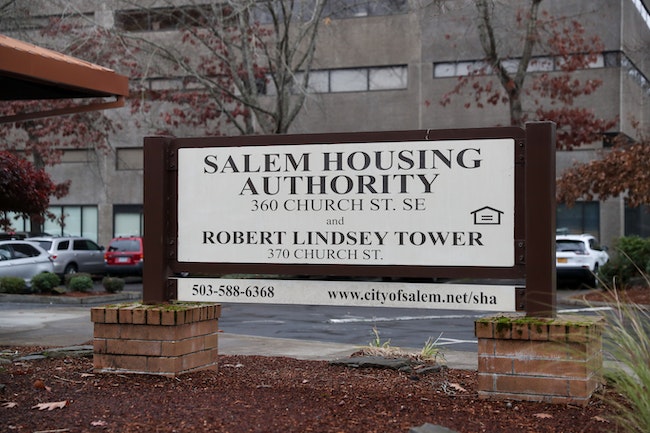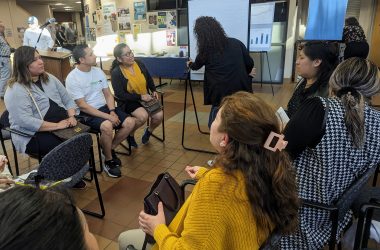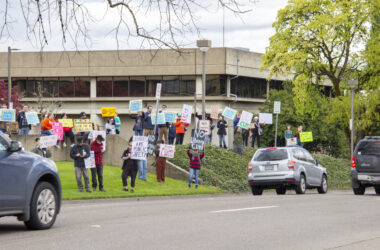The Salem Housing Authority is ending a city program that for five years has paid for housing for chronically homeless Salemites to live in private rentals.
The end comes as other options for low-income housing have become more available in the city.
Through the city-funded Homeless Rental Assistance Program, caseworkers help connect people with doctor’s appointments, driver’s licenses, employment, health care, food stamps and social security — meeting with them weekly. The program covers initial housing costs like a security deposit and can pay for rent and other expenses for up to a year.
That’s when they become eligible for federally funded vouchers to subsidize their rent.
The program was intended to get Salem’s 100 hardest people to house off the streets and into a permanent living situation. That work will continue, but it will no longer be a separate program within the Housing Authority, or rely on the city’s general fund to pay for housing.
Since its inception in March 2017, the city has paid about $4.6 million toward the program, using general fund money which is primarily paid for by property taxes. Of the 330 people who enrolled in the program since it started, 237 have been housed, 178 are currently in some form of housing and 81 are awaiting placement in housing, according to agency data. Others have since been evicted, died or unenrolled from the program.
But the program was never intended to be funded long-term by local taxpayer dollars. “Our goal was to try to find resources and ability to pay for that within the housing authority,” said Nicole Utz, administrator for the city agency.
Utz said they’re now looking to rely fully on the federal emergency vouchers for housing that have become more available in the past year.
The rental assistance program was created when Salem had no permanent public housing projects intended to serve chronically homeless people, forcing housing authority caseworkers to rely on private landlords to house clients who often had histories of eviction and other challenges.
The money available to help homeless people in Salem find housing won’t look much different aside from the funding source, she said. But the housing authority can also now refer people to local housing projects offering on-site services that fit their needs, as opposed to scattered sites around Salem.
At a Salem Housing Authority meeting Aug. 22, Utz said an estimated 300 to 400 transitional housing units have been added in the city since the start of the program.
People could be referred to new projects such as micro shelters, Redwood Crossings, the ARCHES Inn, or impending ones like Yaquina Hall next year, Sequoia Crossing slated for early 2024 and eventually the planned navigation center.
“It’s really going to be that they’re going to get effective tools in one location as opposed to being all in scattered homes,” she said.
The Homeless Rental Assistance Program currently has three full-time employees and one part-time position. Of those, two are case managers and two are program navigators. according to a Salem Housing Authority agenda item from the Aug. 22 meeting.
There were currently 24 people housed through the program as of July 31 who have yet to move on to the federally funded vouchers, and another 19 enrolled in the program awaiting housing.
Of those enrolled, 10 have not made contact with the housing authority in the last year. That typically means the agency hasn’t found them in camps or they just aren’t engaging with the program.
“Their names remain on there until we determine that we’ve taken every effort to try to find them,” Utz said
The federal Department of Housing and Urban Development in recent years began funding a program similar to Salem’s that provides rental assistance as well as money for “barrier removal,” which pays for security deposit application fees, moving expenses and in some cases basic necessities.
In the past year, the housing authority has gotten 34 emergency housing vouchers from the from the federal agency for people who are homeless, at risk of becoming homeless, or victims of sex trafficking or domestic violence.
The housing authority spent all of the emergency housing vouchers and has requested more. Utz said they will also be seeking stability vouchers, which are also intended to help homeless people transition into housing but require coordination between local housing and health agencies.
Often, case managers with the housing authority work with people for up to six months before they receive an apartment.
That means helping them get a driver’s license, birth certificates and everything else needed to rent an apartment, as well as going through credit and criminal histories before applying for properties.
Once they’re housed, the program connects them with furniture, kitchen items and other basic items. Case managers meet with them weekly to go over their next goal or task, and verify conditions at the apartment are good.
“We’re not stopping what we do and (what) we believe is effective here at the Housing Authority. We’re just changing the way it looks,” Utz said. “We are still here every single day providing that outreach and those services. It’s just a redesign of the program as a part of a bigger strategic plan for the housing authority to grow.”
Eventually, Utz said the housing authority will act as a referral agency for the federal vouchers and housing.
They won’t accept any more referrals for the Homeless Rental Assistance Program, but caseworkers will continue to work with those already enrolled in the program until they’re considered stabilized. Those caseworkers will stay with the agency when the program ends.
Utz said the housing authority will remain involved in “coordinated entry,” which links local homeless service providers together through a common database with information about people seeking services and the type of help they need.
Contact reporter Ardeshir Tabrizian: [email protected] or 503-929-3053.
JUST THE FACTS, FOR SALEM – We report on your community with care and depth, fairness and accuracy. Get local news that matters to you. Subscribe to Salem Reporter starting at $5 a month. Click I want to subscribe!

Ardeshir Tabrizian has covered criminal justice and housing for Salem Reporter since September 2021. As an Oregon native, his award-winning watchdog journalism has traversed the state. He has done reporting for The Oregonian, Eugene Weekly and Malheur Enterprise.









